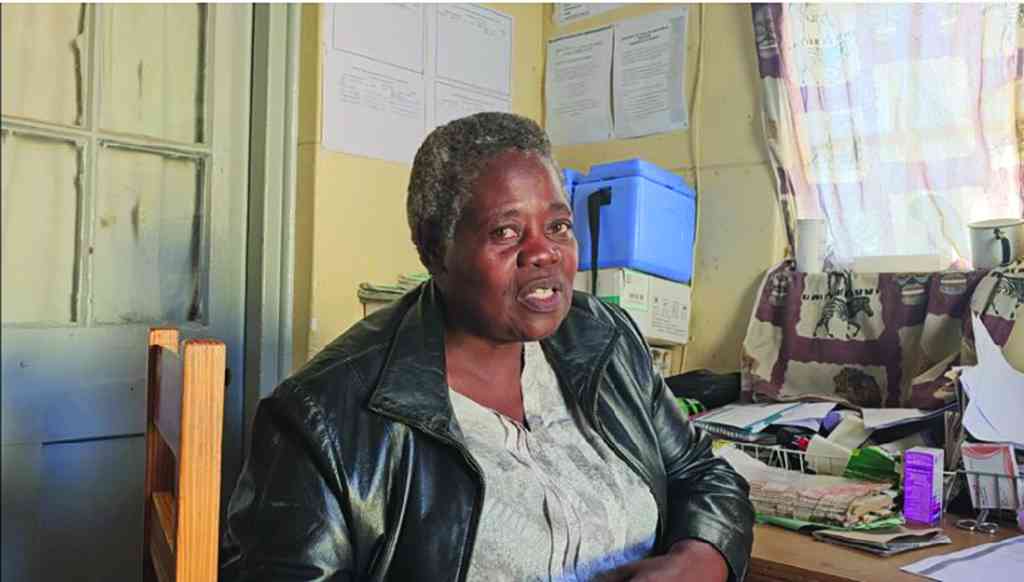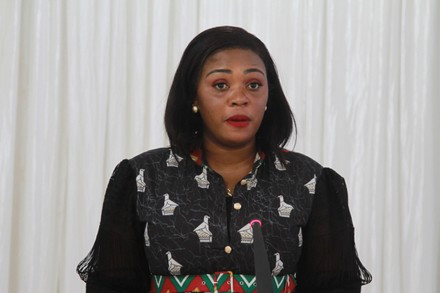
IT’S Friday, 1035am, at Chivhu General Hospital in Chikomba district, Mashonaland East province.
The out-patient department waiting area is a sea of anxious faces, a long queue of patients snaking to the consultation room like a tangled vine.
A woman in her early twenties joins the queue.
The woman’s clean shaven head glistens in the light, a testament to her devotion to the Johanne Marange apostolic sect tradition.
Upon her bare scalp, she carefully places a rolled woolen hat, its earthy tones a stark contrast to her smooth skin.
The hat’s edges are neatly folded, forming a snug fit that frames her face with a sense of modesty and humility. With a furtive glance around, the woman swiftly navigates through the crowded waiting area, her eyes fixed on the consultation room.
She bypasses the long line of patients waiting to be attended to, her movements swift and purposeful.
Approaching the nurse with a sense of urgency, she leans in close, her voice barely above a whisper, she utters a subtle yet significant word, “special”
- Police brutality victim heaves sigh of relief
- A ‘special’ code unlocks hidden healthcare for Johanne Marange women
Keep Reading
The word seems to blend into the background noise of murmurs and coughs, lost on the scores of patients waiting for their turn.
But amid the chaos, the pair of ears in front of her picks up the subtle cue. . . those of a keen-eyed nurse, well-versed in the secret language.
With a knowing glance, the nurse discreetly acknowledges the code and a hidden understanding is exchanged.
In this fleeting moment, a lifeline is extended to a woman bound by a doctrine that forbids seeking medical care, yet desperate for relief.
The whispered word, “special”, becomes a beacon of hope, a testament to the resilience of a woman, identified as Mai Ishmael (not her real name), navigating the treacherous landscape of faith and health.
The nurse discreetly hands the woman a small packet of tablets, her eyes locking onto hers with a knowing glint.
The woman’s fingers swiftly close around the package, her palm forming a tight fist.
With another furtive glance around the crowded surrounding, she swiftly conceals the tablets in the folds of her clothing, her movements surreptitious.
Her eyes dart around the space, ensuring no one has witnessed the exchange.
Satisfied that she has gone unnoticed, she exhales a quiet sigh of relief. The tablets are now hidden from prying eyes, safe from the judgmental gaze of others.
With a subtle nod, she acknowledges the nurse’s understanding, their shared secret locked away in a silent understanding.
“Special” has become a password to preferential treatment not only for Mai Ishmael, but for dozens of women of the Johanne Marange apostolic sect that visit Chivhu General Hospital secretly.
It is a code that has unlocked healthcare priority care, hidden from the judging eyes of their religious community.
According to the Johanne Marange Apostolic sect, seeking modern medical attention is a forbidden act, worldly and sinful. The members’ predicament is worsened by the fact that there is no government policy compelling followers of such sects to seek medical care.
But some women are willing to risk it all for their health, using this secret code, “special” to access care without alerting their church leaders.
Scores of Johanne Marange Apostolic women, including children, have died while giving birth owing to lack of medical care.
In 2022, 14-year-old Anna Machaya died while giving birth at a Johanne Marange shrine in Manicaland province, an incident which sparked outrage across the country.
Delight Masomeke (14) of Bvumbura village in Chivhu gave birth to a baby girl on December 29, 2022, at Masasa in Buhera, but died three days later.
In the same year, Nokutenda Hwaramba (15) also died while giving birth at an apostolic sect shrine in Bikita, Masvingo province.
Last year, 15-year-old Ferby Munyafi of Chiadzwa village in Marange died from excessive bleeding while delivering under the watch of a faith healer.
Chivhu General Hospital community health nurse Tapuwa Chiwanga told NewsDay that the health institution had escalated its campaign to provide access to maternal health among members of the Johanne Marange apostolic sect, which has resulted in a rise in the number of women seeking medical attention, albeit in secrecy.
She said many women from the apostolic sect were secretly seeking maternal healthcare and family planning services.
“They are defying the odds,” Chiwanga said.
“They are very discreet. Some come to the hospital early in the morning before working hours and they come to my residence, while others come after working hours seeking contraceptives. Some disguise themselves as vendors to have access to health practitioners when they come to get health services.”
She said they had recommended family planning methods for these women which are administered in such a way that the women will not be caught by their husbands.
“Behind the veil of religious devotion, the women employ discreet family planning methods, shielded from the scrutiny of their husbands and the patriarchal society they inhabit,” she added.
“They can’t use Jadelle, for instance, because it leaves a mark that can be identified. They are using more discreet methods like the pill or the injection. Their husbands, oblivious to these clandestine efforts, remain convinced that their wives are submissive to the sect’s beliefs.”
Chiwanga says the secret medical health attention has empowered women from the apostolic sects, whose rights are undermined by their husbands as per their doctrine.
“In this private rebellion, the women assert control over their own bodies, defying the societal norms that bind them. Their discreet family planning methods have become a quiet act of resistance, a testament to their determination for freedom. Though their lives appear defined by religious devotion, they have taken control of their own destinies. They can now bear children they are able to take care of,” she said. In the Madamombe community in Chikomba district, where the Johanne Marange sect practices are prevalent, traditional leader Headman Madamombe, born Simbarashe Nhopi, has taken a bold stance towards maternal healthcare and the welfare of children. At community gatherings, Madamombe emphasises the value of women and children’s health and their physical well-being.
He openly encourages women to brave the unfamiliar hospital settings, dispelling imaginary fears and other misconceptions.
The headman also uses his traditional court to protect women against victimisation by their husbands. As the trust and confidence grows, more women find the courage to seek healthcare services, their lives transformed by Madamombe’s dedication to promote maternal healthcare.
“Morals know no traditional for religious boundaries,” Madamombe said.
“We believe that churches should take the leading role in promoting high morals. What morals are there when you watch your child die when they could have been saved at a hospital? As a traditional leader, I am a custodian of traditional culture and morals, so I will intervene wherever I feel there is a violation of culture and morals. In my community, I discourage violence against women and girls so men know that it is a punishable offence to victimise their wives or children.”
A Johanne Marange Apostolic sect leader Grey Chizu (67) of Huchi village in Madamombe area, whose religious title is Rabaoma, told NewsDay that the sect is cognisant of the need for safe child delivery.
“We have our religious beliefs that dictate that we can’t go to the hospital for deliveries, but we also note that women should give birth safely,” Chizu said.
“We have, in this regard, registered our own midwives with the government because we do not defy government policies on safe deliveries. In this community of over 35 villages, we have five midwives, though we feel that we need to increase the number.”
- This story was produced with support from the WAN-IFRA Women in News Social Impact Reporting Initiative.











